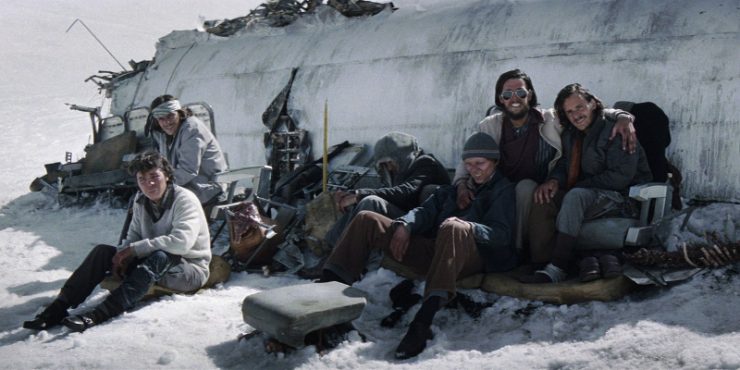Society of the Snow probably isn’t helped by the fact that the most consequential plot point of its story – that a group of rugby players resorted to cannibalism in order to survive in the Andes – is the most well-known part of it. Not only was this story already made into the 1993 film Alive, but a similar tale is woven in the Showtime series Yellowjackets. The degree to which this film has any room to shock is pretty slim, so it instead leans on being an inspirational survival tale. Much like his 2012 film, The Impossible, director J.A. Bayona has an eye for the macabre details that comes with natural disaster. The fragility of the human body when facing the sheer power of the elements seems to be a preoccupation for him. Both films have that hard-to-watch quality, but they also hint toward happy endings, as if the human spirit is the movie’s real hero.
The film is about a Uruguayan rugby team flying to Chile for a competition. When the plane fails to make it over one of the Andes mountains, it cracks in half and lands in between the peaks; one of the coldest, most remote places in the world. Of the 45 passengers (including the plane’s staff), only sixteen manage to avoid immediate death. The rest are forced to brave the elements in hopes that a rescue arrives. As the days pass, it becomes apparent that their only chance at survival will come with eating the bodies of the dead. Aside from eating their fellow athletes and loved ones, the team is also met with oppressive amounts of snow and subarctic temperatures. More and more of them begin to die, whether from the cold or from infection from their injuries. When the rescue finally does arrive, their continued existence is awash in trauma.
Say what you will about the misery porn of Alejandro Gonzalez Iñárritu, at least the man has an ethos. Bayona’s approach to these stories is to sculpt set pieces with such skill and wonder that it’s not always easy to register how depraved they are. Society of the Snow is a film so interested in its characters unending bad luck that it’s hard to find any interest in their small forms of triumph. Bayona’s films are pure pathos, but the script (by Bayona and three others) puts little investment into the stranded group. The details of their lives are presented only to heighten the tragedy of their circumstance. It’s a very uninteresting approach. Above all, Society of the Snow commits the gravest sin of all: it’s boring. The film’s one note is hammered thoroughly thirty minutes into it’s two-hour-plus runtime and continues ad infinitum – it’s a punishing experience, but not in the way it’s meant to be.
Directed by J.A. Bayona










